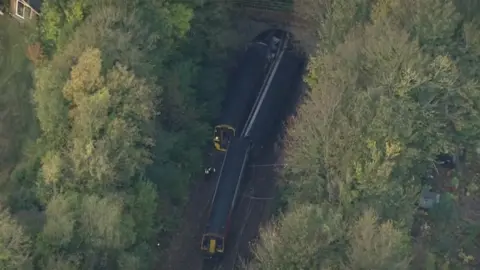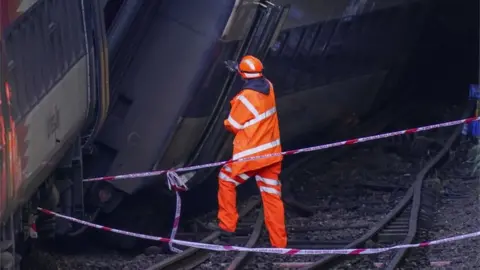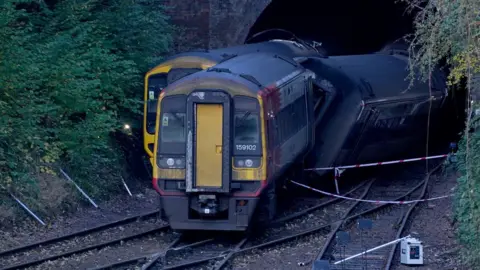Salisbury train crash: Service ran through red light after wheel slip
 BBC
BBCInvestigators say "low adhesion" between the track and train wheels was the most likely cause of the crash between two trains in Salisbury.
The trains collided on the approach to a tunnel near Salisbury station at about 18:45 GMT on Sunday.
One of the drivers is believed to have suffered "life-changing" injuries.
Investigators say the GWR train was "protected by a red signal" before being hit by a South Western train.
Andrew Hall, from the Rail Accident Investigation Branch, said the South Western train was "required to stop" but "it did not stop".
Initial evidence was that the driver did attempt to brake at a red signal before the train suffered "wheel slide".
"Unfortunately, it did not stop and struck the side of the Great Western train at an angle such that both trains derailed and ran alongside each other into the tunnel.
"We are continuing to pursue this as a line of investigation amongst others," he added.
The Rail Delivery Group said low adhesion can be caused by "moisture on the rail mixing with the film produced by 'leaves on the line' or other contaminants, such as rust or grease."
They add the problem can be worse in autumn and that "it can also cause safety risks, such as signals passed at danger and station overruns".
 PA Media
PA MediaMr Hall said the initial results of the investigation would be made public later in the week.
The crash has caused major disruption, with lines through the city expected to remain closed until at least the end of Monday.
Of the 92 passengers on board the two trains, 14 required hospital treatment for minor injuries.
The South Western Railway (SWR) train was running from London to Honiton, Devon, while the Great Western Railway (GWR) service was travelling from from Southampton to Cardiff as they both collided at Fisherton Tunnel.
Both trains had passed a Y-shaped junction, close to the entrance of the tunnel, before the collision.
Martin Frobisher, Network Rail's safety and engineering director, said: "Sunday's accident was incredibly frightening for everyone involved and our thoughts are with everyone injured or affected in any way.
"Initial findings suggest that low adhesion played a key part in causing the collision.
"It's an issue that affects railways across the world and is something that we, and our train operator colleagues, work hard to combat - so that we can run trains safely and reliably throughout autumn, and why incidents such as the one in Salisbury at the weekend are incredibly rare."
 PA Media
PA MediaTransport minister Chris Heaton-Harris paid tribute to those injured in the crash.
"There are plenty of lessons I am sure that will be learned but we are at the very early stages of the investigation," he added.
Wiltshire Police deputy chief constable Paul Mills said: "Although thankfully no-one lost their lives, it is hard to imagine the shock and distress this incident would have had caused those onboard both trains."
SWR and GWR are offering alternative train services and rail replacement buses, but people are being advised not to travel on that part of the network until the lines have fully reopened.

Salisbury MP John Glen said the closure of the line was "hugely disruptive" and his thoughts were with the driver and all those affected.
"It was obviously a shocking event and one doesn't expect this sort of thing to happen.
"It's a key line and there's a significant commuting population, and this disruption is hugely damaging to people's lives."

Follow BBC West on Facebook, Twitter and Instagram. Send your story ideas to: [email protected]
